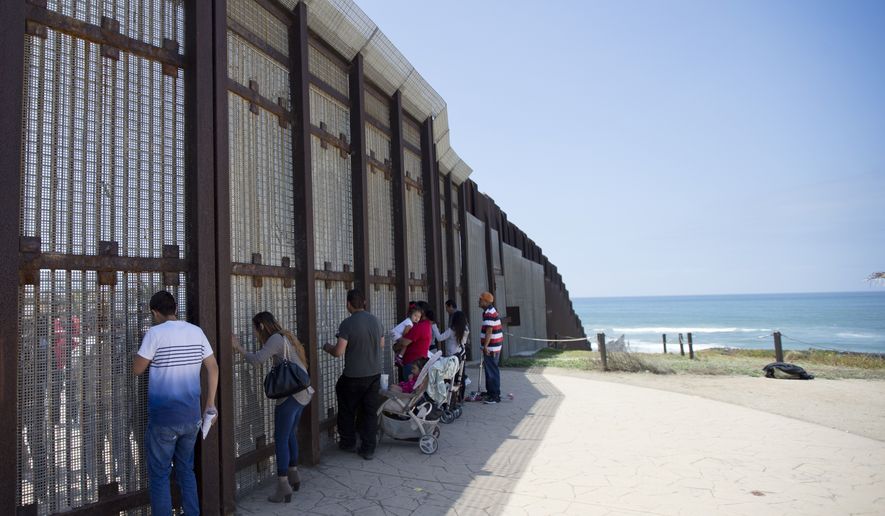The House Homeland Security Committee gave first approval to the broad scope of President Trump’s border wall Wednesday, clearing a bill that would authorize $10 billion in new infrastructure spending, new waivers to speed up construction, and 10,000 more border agents and officers to patrol the U.S.-Mexico line.
Democrats vehemently opposed the bill, saying the wall was a boondoggle and the fact that U.S. taxpayers will fund it violates the president’s campaign pledge to make Mexico foot the bill.
But Republicans backed the bill in a 18-12 party-line vote, saying it was time to get a handle on the border.
“We’ve been talking about border security for so many years, and now we finally have a chance to get this done. We finally have a partner in the White House who has prioritized this issue,” said committee Chairman Michal McCaul, the Texas Republican who wrote the legislation.
His bill goes well beyond wall-building.
It would add 5,000 new Border Patrol agents to watch the line, and 5,000 new Customs and Border Protection officers to man the ports of entry; demand the government finally complete the biometric entry-exit system that’s been on the books for two decades; and directs cash to both local authorities in the U.S. and to the Mexican government for cooperation on border-related law enforcement.
The legislation also authorizes governors to deploy their National Guard to help patrol the border.
The immigration debate is heating up in Congress, with lawmakers racing a March deadline for approving legislation to grant permanent legal status to illegal immigrant Dreamers.
Democrats want a full pathway to citizenship and say it should be a mostly stand-alone amnesty, but Republicans have said they want to see border security and other measures attached to head off a future wave of illegal immigration.
Mr. McCaul’s bill could become a rallying point for Republicans.
But Democrats said the $10 billion included for infrastructure won’t begin to cover the total cost of a wall, which Rep. Bennie Thompson of Mississippi, the panel’s ranking Democrat, said could reach $70 billion. He also said building it would require grabbing land from private landowners.
“The bill before us would authorize Trump’s border wall at all costs,” he said. “I hope that after today, we can have a serious conversation about the border and move forward together in a productive manner.”
Democrats said focusing on the border was misplaced. They pointed to a Homeland Security study last month that found years of attention and spending have produced real results already.
The rate of illegal immigrants being apprehended is up while recidivism — those already deported trying again — has dropped from 30 percent a decade ago to slightly above 10 percent in 2016.
Got-aways — those believed to have successfully snuck in — dropped from more than 600,000 a decade ago to about 100,000 last year.
Democrats said a bigger issue is visa-overstays, who are temporary visitors who come legally but don’t leave when their permits expire. Homeland Security data suggests they top 600,000 a year.
The entry-exit system included in the bill is designed to help identify overstays.
During the debate Democrats offered amendments to stop the government from waiving major laws to build the wall. Those moves were rejected by the GOP.
One Democrat offered an amendment he said would have built the sea-to-sea concrete wall proposal Mr. Trump had called for during the campaign. It was defeated 23-0, with Republicans dismissing it as a “creative” stunt.
The president has given conflicting ideas about what he envisions for his wall.
He now says there’s no need for a border-long wall, saying somewhere between 700 and 900 miles of wall is needed. It’s still not clear whether that’s a total, or whether it’s in addition to the 354 miles of existing fencing and 300 miles of vehicle barrier.
Homeland Security has begun construction of eight prototypes for new wall designs in San Diego.
• Stephen Dinan can be reached at sdinan@washingtontimes.com.




Please read our comment policy before commenting.